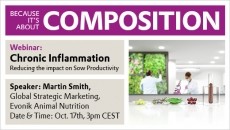Reports from VIV Europe 2018
Poultry industry taking shape in Africa
Nan-Dirk Mulder, global animal protein specialist, Rabobank, outlined future trends in Africa in a seminar about investment opportunities in that region as part of the conference program at VIV Europe 2018 last week. He spoke to FeedNavigator afterwards.
“The past 15 years have seen significant economic [development] in Sub-Saharan Africa, leading to a growing middle class. Due to fast population growth and urbanization - the big cities like Lagos [Nigeria’s largest city] and Kampala (Uganda’s capital] are rapidly expanding as people migrate from the countryside to find work– there is a need for more modern farming in Africa. Those factors and rising demand are leading to opportunities for local and international investors in the food and agri sector. The poultry [industry] is very much in the lead … due to the short production cycle.”
The South African market is already well developed and other markets, like Nigeria, would seem to be on their way, he said.
“Feed costs in South Africa are comparable to that in Eastern Europe. It is not the lowest in the world but it is competitive.”
But there aren’t a lot of economies of scale yet in other Sub-Saharan countries: “You need to start everything up [in those particular markets].”
There is potential for grain and soybean production in Africa but it has to be developed, said Mulder.
Some feed manufacturers have been getting involved in indigenous grain and oilseed production in African markets, sometimes teaming up with a local player, to make that sector more efficient and to ensure sufficient volumes of grains and oilseeds for their feed mills and poultry production, he explained.
The rising middle class creates new demands. “Traditionally, African consumers buy in a live bird market and [that it still the case to a large extent]. But the middle class [consumer] wants something different and they start buying products in supermarkets and in restaurant chains.”
Expansion by fast food giants and supermarket chains
One of the major changes over the past five years in Africa has been expansion throughout the continent by both local and international retailers as well as fast food groups like KFC, he said.
“The combination of expanding supermarkets and restaurant chains [in Africa] needs modern production, needs a cold chain, [and these factors are] creating opportunities for investors in the sector as you need to upgrade the value chain from a relatively traditional one to a more modern chain.”
Animal production growth rates in many African markets are in and around 8-10% at the moment. “That is very fast, one of the fastest in the world, but it comes from a low base, of course. If you have this growth over the next five consecutive years, you will get quite a sizeable industry and also a more modern one, aligned with this changing demand from supermarkets.”
International investment
Looking at international investment projects in Africa we have reported on the past year or so, a major development was the move by Olam International last September to set up a new poultry feed mill, hatchery and poultry farm in Kaduna State in Nigeria. In parallel, Olam's integrated poultry and fish feed mill at Ilorin in Kwara State in that country also came on stream that month.
Sharad Gupta, senior vice president of Olam Grains and head of Olam Animal Feeds and Protein, told FeedNavigator then about the size of the opportunity that the West African country represents.
“If we want to change the trajectory of the poultry industry in Nigeria, we have to believe in its potential down the road, and we had to build two mills with optimum scale and size to cover the entire country.”
“Nigeria has a lot going for it. It has a large and growing population. By any number of estimates, it will have the third largest population globally by 2050, if not by 2040, so the market is very attractive from a demographic perspective.
“Moreover, the consumption of eggs, poultry and fish is below average levels when comparing Nigeria to countries of a similar development and income level. Much of the reason for [that low consumption rate] is historical. For the past three decades, Nigeria had an oil dependent economy, largely reliant on food imports, with little domestic production. The resulting high level of income disparity led to a lower per capita consumption of many food categories."
Meanwhile, in relation to setting up oilseed production in Africa, in January last year, we heard from French sustainable farming initiative, Fondation Avril, who, together with AGROPOL, the association responsible for international cooperation and development in the French vegetable oils and proteins sector, signed an agreement in Paris with the agriculture ministry of Burkina Faso to develop and structure soybean cultivation in that African country.
















